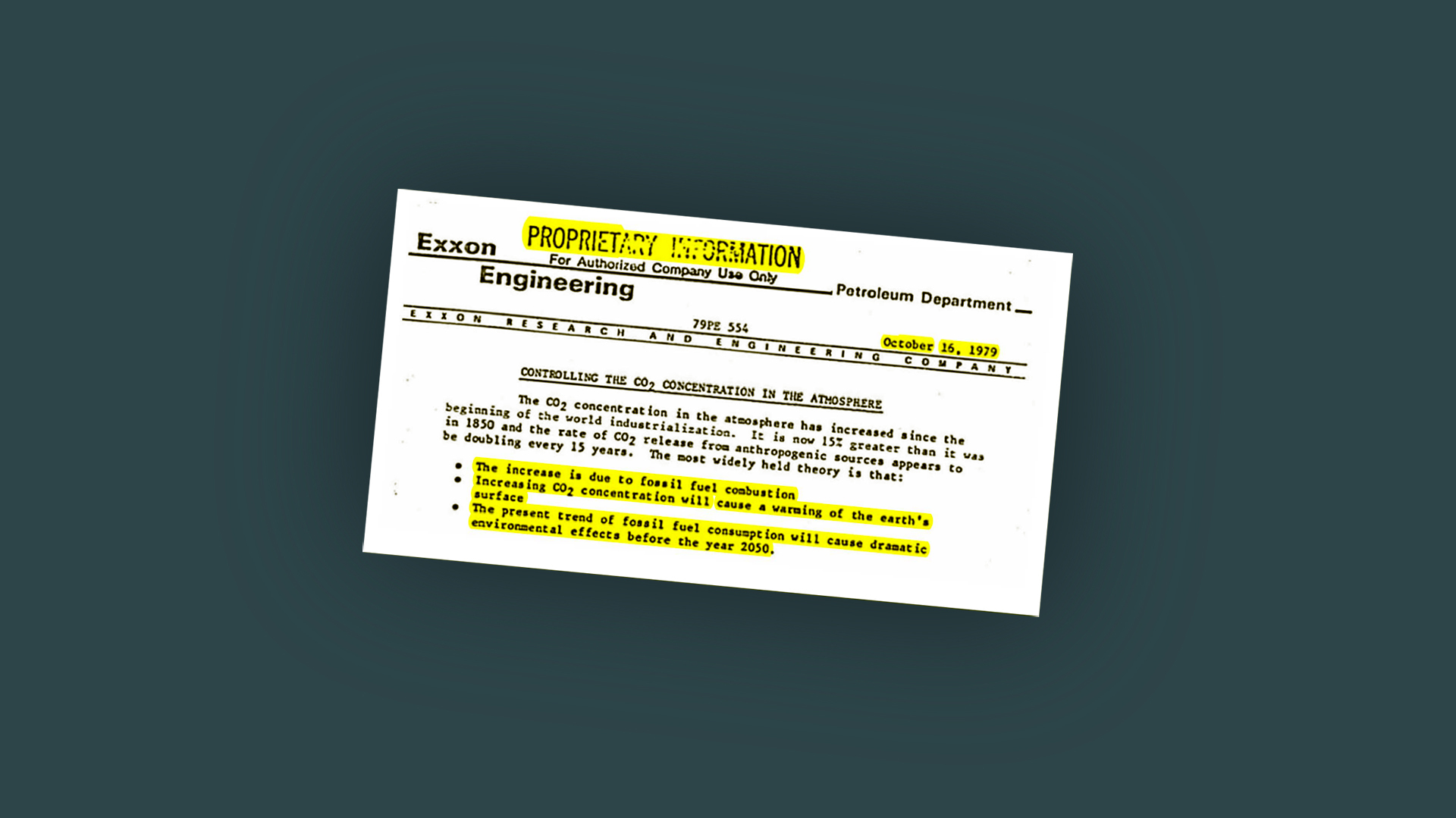Last week, Minnesota Attorney General (AG) Keith Ellison filed a lawsuit against the American Petroleum Institute (API), ExxonMobil, and three different Koch Industry entities for their misinformation campaigns about climate change, and for knowingly promoting fraudulent advertising and marketing strategies.
The following day, Washington D.C. AG Karl Racine filed a similar lawsuit against fossil fuel companies ExxonMobil, British Petroleum (BP), Royal Dutch Shell, and Chevron, alleging that the companies knew the impact of their industry as early as the 1950’s and continued to spread disinformation.
While these are not the first lawsuits justice departments have filed that aim to bring accountability to fossil fuels companies, it’s the first major set of lawsuits that directly target the companies’ use of misinformation and false advertising.
Lawsuits allege consumer protection violations
Unlike other lawsuits against the fossil fuel industry, which typically seek reparations for both the present and future damages to our environment and climate, these new suits attack companies’ efforts to mislead consumers, echoing a similar lawsuit filed in October 2019 by Massachusetts AG Maura Healy.
By suppressing scientific information and engaging in decades worth of disinformation campaigns, fossil fuel companies knowingly harmed public and environmental health.
Both lawsuits allege that, by withholding and distorting information about fossil fuels impacts to consumers, the companies violated the state’s consumer protection laws. In short, these consumer protection laws serve to protect those who purchase goods or services from “inferior, adulterated, hazardous, and deceptively advertised products, and deceptive or fraudulent sales practices.”
By suppressing scientific information and engaging in decades worth of disinformation campaigns, fossil fuel companies knowingly harmed public and environmental health. The lawsuit from Washington D.C. AG Racine additionally claims that the companies had “grossly exaggerated their commitment and investment to reduce carbon footprints,” further misleading consumers by claiming that they were working to lessen their environmental impact and expand alternative energy sources.
Both lawsuits provide avenues for restitution, which include providing financial relief to local communities, carrying out accurate public information campaigns about climate change, releasing all research and data related to climate, and barring companies from continuing to promote false information about fossil fuels.
A brief history of fossil fuel lawsuits
In 2015 and 2016, New York, Massachusetts, and the U.S. Virgin Islands first launched investigations into fossil fuels and whether or not companies, specifically Exxon, had knowingly pushed false advertising and deceived investors and consumers. Exxon hit back with countersuits and appeals, attempting to dismiss the allegations as meritless on the grounds that their claims were merely speculative and held no truth.
By October 2018, New York had filed a formal lawsuit against Exxon and the case went to trial at the end of 2019, where Exxon was ultimately cleared of all charges. Around the same time, Massachusetts AG Maura Healy filed her lawsuit against Exxon, which is still ongoing and was recently amended to account for the impact of COVID-19 and the parallels it draws to the potential economic disruptions we might see from climate change.
Nine other cities and counties have also previously filed lawsuits against fossil fuel companies seeking financial compensation for climate change and environmental degradation.
Decades of denial
It’s really no surprise that governments are finally taking legal action against the deceitful communication practices deployed by these companies. As more and more evidence comes to light, it points to the fact that fossil fuel companies did know the impact of their products and industry.
In 2015, environmental media outlet InsideClimate News published an in-depth, multi-part series revealing that Exxon had conducted their own in-house climate research and had become consciously aware of the impact burning fossil fuels would have on climate. Exxon’s research into fossil fuels environmental impact began in the 1970’s, which kick-started decades worth of denial and stifling of climate action, a narrative they are still trying to uphold today.
In October of 2019, the U.S. House Committee on Oversight and Reform held a hearing to examine the oil industry’s efforts to suppress research about climate change. Among the witnesses for this hearing were previous Exxon scientists and consultants, Dr. Ed Garvey and Dr. Martin Hoffert. These scientists testified that, in the 1970’s to 1980’s, they had created climate models for Exxon that predicted future climate change and heightened carbon dioxide levels from the continued burning of fossil fuels.
Their models, as the hearing illustrated, accurately depicted the rising temperatures and heightened carbon dioxide concentrations in the atmosphere from fossil fuel burning that we’re seeing today. It’s clear that the misinformation campaigns have been an ongoing attempt to sustain the fossil fuel industry, and now governments are finally ramping up lawful repercussions for fossil fuels wrongdoing in communicating these falsities.
The organized efforts of the fossil fuel industry worked to obfuscate the consensus that their own internal scientists had calculated and confirmed, which was that increasing carbon emissions would drive global climate change. The Oversight Committee hearing and the lawsuits draw parallels to the tobacco industry’s efforts to suppress the scientific link between smoking and cancer, which also faced lawsuits for violating consumer rights. In his press release announcing the lawsuit, Racine writes:
“The companies not only employed the Advancement of Sound Science Coalition—a fake grassroots citizen group created by Big Tobacco as part of the industry’s misinformation campaign—they also funded and promoted some of the same scientists hired by tobacco companies. These scientists disputed the conclusions of climate researchers, despite not having any training in climate science themselves. As the public learned that defendants knew of their products’ role in causing climate change, the companies pivoted to misleading the public about their investments in sustainable energy and transition from fossil fuels.”
Not only were these companies aware of the damage fossil fuels would inflict on both human health and the natural environment, they actively sought ways in which they could undermine the growing scientific consensus on the matter, while continuing to prioritize profits over people.
The deception continues
The issuing of these lawsuits is a major step towards addressing the deception perpetrated by fossil fuel companies in an attempt to downplay the climate crisis and the urgency in which it must be mitigated. While these lawsuits instill a newfound sense of hope that these fraudulent campaigns will cease, there are still ways for fossil fuel companies to promote their products through alternative approaches.
A recent article from Rebecca Leber of Mother Jones found that natural gas companies were actually paying instagram influencers to promote natural gas appliances, despite research showing that gas stovetops create noxious fumes and increase indoor air pollution, even in short bursts. The influencers give praise to natural gas stoves for their higher quality and faster cooking time, they even employed the hashtag #cookingwithgas and tagged the American Gas Association. The posts have since been removed, but their existence demonstrates that the industry continues to exhaust every pathway to continue to promote fossil fuels as a safe, sustainable source of energy.
Fossil fuel companies throw millions of dollars into advertising every year to push their message disinformation. Over the past three decades, five of the major fossil fuel firms spent a combined $3.6 billion in advertisements, which is roughly $120 million dollars a year on ads.
Some media outlets have banned ads from fossil fuels altogether, namely The Guardian. Other platforms, like Twitter, moved to ban the use of political or issue ads altogether, with Twitter CEO Jack Dorsey claiming that “political message reach should be earned, not bought.” The caveat is that while the policy aims to diminish false advertising, it still allows fossil fuels to discreetly spread disinformation about the climate crisis and exaggerate their efforts to address it. Facebook, on the other hand, recently deemed climate denial as “opinion” content and is therefore exempt from the site’s fact-checking, according to the latest reporting from Emily Atkin of HEATED and Judd Legum of Popular Information. The group behind persuading Facebook to make this change has heavy ties to fossil fuels, and ironically called the “CO2 Coalition.” And today, July 1st, environmentalists and politicians penned a letter to Facebook, arguing that “by allowing climate misinformation to go unchecked, Facebook is actively putting the health and well-being of our nation’s most vulnerable low-income communities and communities of color at risk.”
Fossil fuels are grasping at straws in an attempt to maintain their social license to operate, but these lawsuits might be able to stifle those efforts. Both lawsuits ask for a trial by jury, where applicable, and demand that fossil fuel firms pay for the damage they have caused and cease further campaigns of misinformation. Minnesota has warmed faster than the rest of the country and the world and D.C. is experiencing more frequent flooding and increased summer heat. These lawsuits could open the eyes of many who have been fed messages teeming with fallacies, helping to build support for a transition away from fossil fuels. As the litigation of these cases moves forward, there is hope that we’ll be able to successfully hold fossil fuel companies accountable for the damage that they have inflicted and hold them responsible for the affliction that has yet to come.









